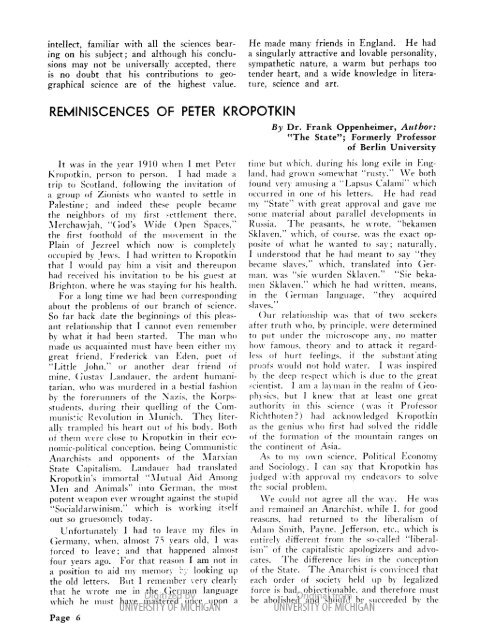Centennial Expressions on Peter Kropotkin 1842-1942.
Centennial Expressions on Peter Kropotkin 1842-1942.
Centennial Expressions on Peter Kropotkin 1842-1942.
You also want an ePaper? Increase the reach of your titles
YUMPU automatically turns print PDFs into web optimized ePapers that Google loves.
intellect, familiar with all the sciences bearing <strong>on</strong> his subject; and although his c<strong>on</strong>clusi<strong>on</strong>s may not be universally accepted, there<br />
is no doubt that his c<strong>on</strong>tributi<strong>on</strong>s to geographical science are of the highest value.<br />
He made many friends in England. He had<br />
a singularly attractive and lovable pers<strong>on</strong>ality,<br />
sympathetic nature, a warm but perhaps too<br />
tender heart, and a wide knowledge in literature, science and art.<br />
REMINISCENCES OF PETER KROPOTKIN<br />
By Dr. Frank Oppenheimer, Author:<br />
"The State"; Formerly Professor<br />
of Berlin University<br />
It was in the year 1910 when I met <strong>Peter</strong><br />
<strong>Kropotkin</strong>, pers<strong>on</strong> to pers<strong>on</strong>. I had made a<br />
trip to Scotland, following the invitati<strong>on</strong> of<br />
a group of Zi<strong>on</strong>ists who wanted to settle in<br />
Palestine; and indeed these people became<br />
the neighbors of my first settlement there,<br />
lerchawjah, "God's Wide Open Spaces,"<br />
the first foothold of the movement in the<br />
Plain of Jezreel which now is completely<br />
occupied by Jews. I had written to <strong>Kropotkin</strong><br />
that I would pay him a visit and thereup<strong>on</strong>t<br />
had received his invitati<strong>on</strong> to be his guest at<br />
Bright<strong>on</strong>, where he was staying for his health.<br />
For a l<strong>on</strong>g time we had been corresp<strong>on</strong>ding<br />
about the problems of our branch of science.<br />
So far back date the beginnings of this pleasant relati<strong>on</strong>ship that I cannot even remember<br />
by what it had been started. The man who<br />
made us acquainted must have been either myx<br />
great friend, Frederick van Eden, poet of<br />
"Little John," or another dear friend of<br />
mine, Gustav Landauer, the ardent humanitarian, \xho was murdered in a bestial fashi<strong>on</strong><br />
by the forerunners of the Nazis, the Korpsstudents, during their quelling of the Communistic Revoluti<strong>on</strong> in Munich. They literally trampled his heart out of his body. Both<br />
of them were close to <strong>Kropotkin</strong> in their ec<strong>on</strong>omic-political c<strong>on</strong>cepti<strong>on</strong>, being Communistic<br />
Anarchists and opp<strong>on</strong>ents of the Marxian<br />
State Capitalism. Landauer had translated<br />
<strong>Kropotkin</strong>'s immortal "Mlutual Aid Am<strong>on</strong>g<br />
Men and Animals" into German, the most<br />
potent weap<strong>on</strong> ever wrought against the stupid<br />
"Socialdarwinism," which is working itself<br />
out so gruesomely today.<br />
Unfortuinately I had to leave my files in<br />
Germany, when, almost 75 years old, I was<br />
forced to leave; and that happened almost<br />
four years ago. For that reas<strong>on</strong> I am not in<br />
a positi<strong>on</strong> to aid my memory by looking up<br />
the old letters. But I remember very clearly<br />
that he wrote me in the German language<br />
which he must have mastered <strong>on</strong>ce up<strong>on</strong> a<br />
Page 6<br />
time but which, during his l<strong>on</strong>g exile in England, had grown somewhat "rusty." We both<br />
found very amusing a "Lapsus Calami" which<br />
occurred in <strong>on</strong>e of his letters. He had read<br />
imy "State" with great approval and gave me<br />
some material about parallel developments in<br />
Russia. The peasants, he wrote, "bekamen<br />
Sklaven," which, of course, was the exact opposite of what he wanted to say; naturally,<br />
I understood that he had meant to say "they<br />
became slaves," which, translated into German, was "sie wurden Sklaven." "Sie bekamen Sklaven," which he had written, means,<br />
in the German<br />
slaves."<br />
language. "they acquired<br />
Our relati<strong>on</strong>ship was that of two seekers<br />
after truth who, by principle, were determined<br />
to put under the microscope any, no matter<br />
how famous, theory and to attack it regardless of hurt feelings, if the substant ating<br />
proofs would not hold water. I was inspired<br />
by the deep respect which is due to the great<br />
scientist. I am a layman in the realm of Geophysics, but I knew that at least <strong>on</strong>e great<br />
authority in this science (was it Professor<br />
Richthoten) had acknowledged <strong>Kropotkin</strong><br />
as the genius who first had solved the riddle














![The Philosophy of Progress [pdf]](https://img.yumpu.com/14077359/1/190x245/the-philosophy-of-progress-pdf.jpg?quality=85)

